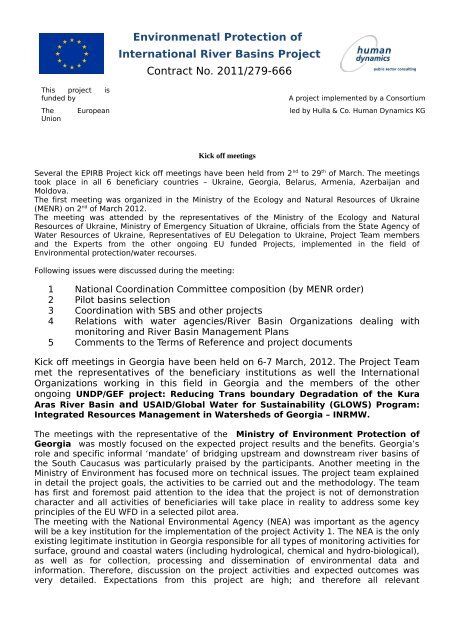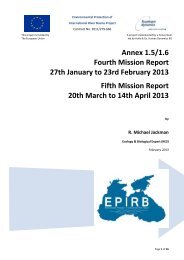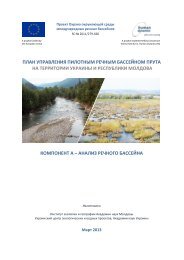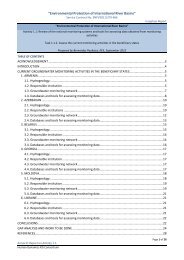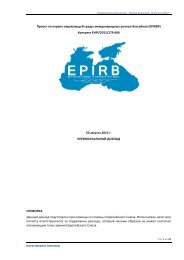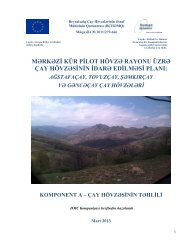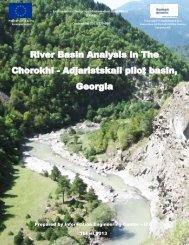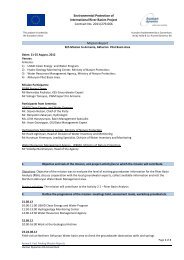Kickoff Meetings memo 118.96 KB - Environmental Protection of ...
Kickoff Meetings memo 118.96 KB - Environmental Protection of ...
Kickoff Meetings memo 118.96 KB - Environmental Protection of ...
You also want an ePaper? Increase the reach of your titles
YUMPU automatically turns print PDFs into web optimized ePapers that Google loves.
Environmenatl <strong>Protection</strong> <strong>of</strong><br />
International River Basins Project<br />
Contract No. 2011/279-666<br />
This project is<br />
funded by<br />
The European<br />
Union<br />
A project implemented by a Consortium<br />
led by Hulla & Co. Human Dynamics KG<br />
Kick <strong>of</strong>f meetings<br />
Several the EPIRB Project kick <strong>of</strong>f meetings have been held from 2 nd to 29 th <strong>of</strong> March. The meetings<br />
took place in all 6 beneficiary countries – Ukraine, Georgia, Belarus, Armenia, Azerbaijan and<br />
Moldova.<br />
The first meeting was organized in the Ministry <strong>of</strong> the Ecology and Natural Resources <strong>of</strong> Ukraine<br />
(MENR) on 2 nd <strong>of</strong> March 2012.<br />
The meeting was attended by the representatives <strong>of</strong> the Ministry <strong>of</strong> the Ecology and Natural<br />
Resources <strong>of</strong> Ukraine, Ministry <strong>of</strong> Emergency Situation <strong>of</strong> Ukraine, <strong>of</strong>ficials from the State Agency <strong>of</strong><br />
Water Resources <strong>of</strong> Ukraine, Representatives <strong>of</strong> EU Delegation to Ukraine, Project Team members<br />
and the Experts from the other ongoing EU funded Projects, implemented in the field <strong>of</strong><br />
<strong>Environmental</strong> protection/water recourses.<br />
Following issues were discussed during the meeting:<br />
1 National Coordination Committee composition (by MENR order)<br />
2 Pilot basins selection<br />
3 Coordination with SBS and other projects<br />
4 Relations with water agencies/River Basin Organizations dealing with<br />
monitoring and River Basin Management Plans<br />
5 Comments to the Terms <strong>of</strong> Reference and project documents<br />
Kick <strong>of</strong>f meetings in Georgia have been held on 6-7 March, 2012. The Project Team<br />
met the representatives <strong>of</strong> the beneficiary institutions as well the International<br />
Organizations working in this field in Georgia and the members <strong>of</strong> the other<br />
ongoing UNDP/GEF project: Reducing Trans boundary Degradation <strong>of</strong> the Kura<br />
Aras River Basin and USAID/Global Water for Sustainability (GLOWS) Program:<br />
Integrated Resources Management in Watersheds <strong>of</strong> Georgia – INRMW.<br />
The meetings with the representative <strong>of</strong> the Ministry <strong>of</strong> Environment <strong>Protection</strong> <strong>of</strong><br />
Georgia was mostly focused on the expected project results and the benefits. Georgia’s<br />
role and specific informal ‘mandate’ <strong>of</strong> bridging upstream and downstream river basins <strong>of</strong><br />
the South Caucasus was particularly praised by the participants. Another meeting in the<br />
Ministry <strong>of</strong> Environment has focused more on technical issues. The project team explained<br />
in detail the project goals, the activities to be carried out and the methodology. The team<br />
has first and foremost paid attention to the idea that the project is not <strong>of</strong> demonstration<br />
character and all activities <strong>of</strong> beneficiaries will take place in reality to address some key<br />
principles <strong>of</strong> the EU WFD in a selected pilot area.<br />
The meeting with the National <strong>Environmental</strong> Agency (NEA) was important as the agency<br />
will be a key institution for the implementation <strong>of</strong> the project Activity 1. The NEA is the only<br />
existing legitimate institution in Georgia responsible for all types <strong>of</strong> monitoring activities for<br />
surface, ground and coastal waters (including hydrological, chemical and hydro-biological),<br />
as well as for collection, processing and dissemination <strong>of</strong> environmental data and<br />
information. Therefore, discussion on the project activities and expected outcomes was<br />
very detailed. Expectations from this project are high; and therefore all relevant
Kick <strong>of</strong>f <strong>Meetings</strong><br />
departments guaranteed their willingness to actively participate and provide all necessary<br />
data and human resources for its successful implementation.<br />
The Project team held the meeting with the Agency <strong>of</strong> Natural Resources, which is a new<br />
institution working under the Ministry <strong>of</strong> Energy and Natural Resources. As the Agency is<br />
responsible for licensing and management <strong>of</strong> groundwater resources in Georgia, it is one <strong>of</strong><br />
the key beneficiary institutions for the project. The meeting had introductory character.<br />
The Kick <strong>of</strong>f meetings in Armenia took place on 12-13 March 2012. The First meeting has<br />
been held with the Water Resources Management Agency - WRMA, Ministry <strong>of</strong><br />
Nature <strong>Protection</strong> <strong>of</strong> Armenia. The Water Resources Management Agency (WRMA) is<br />
part <strong>of</strong> the Ministry <strong>of</strong> Nature <strong>Protection</strong> <strong>of</strong> Armenia. After the team <strong>of</strong> the Project<br />
presented objectives and main technical activities <strong>of</strong> the project, as well as the expected<br />
outcomes <strong>of</strong> the mission in Armenia: establishment <strong>of</strong> the project National Coordination<br />
Committee; nomination <strong>of</strong> representatives in the Regional Steering Committee, selection <strong>of</strong><br />
a trans-boundary pilot basin for Armenia, it was mentioned that the project understands<br />
the complications <strong>of</strong> the political situation in the region and the difficulty <strong>of</strong> selecting a pilot<br />
area bordering Azerbaijan. It was advised to consider the possible effect <strong>of</strong> upstream to<br />
downstream relationship, however selection will be completely up to the beneficiaries and<br />
the project activities will concentrate in the pilot area.<br />
The meeting was focused on the details <strong>of</strong> the proposed pilot area – the Akhurian river<br />
basin, which was suggested by the Armenian beneficiary institutions. The composition <strong>of</strong><br />
the project National Coordination Committee and possible synergy with the EU’s ongoing<br />
project - ‘Support to the EU Water Initiative in Eastern Europe, the Caucasus and Central<br />
Asia (EUWI EECCA)’ was discussed as well.<br />
List <strong>of</strong> the <strong>Meetings</strong>:<br />
State Committee <strong>of</strong> Water Systems - SCWS, Ministry <strong>of</strong> Territorial Administration<br />
<strong>of</strong> Armenia;<br />
<strong>Environmental</strong> Impact Monitoring Centre - EIMC, Ministry <strong>of</strong> Nature <strong>Protection</strong> <strong>of</strong><br />
Armenia;<br />
Armenian State Hydrometeorological and Monitoring Service, Ministry <strong>of</strong><br />
Emergency Situations<br />
Hydrogeological Monitoring Centre, Ministry <strong>of</strong> Nature <strong>Protection</strong> <strong>of</strong> Armenia;<br />
Ministry <strong>of</strong> Nature <strong>Protection</strong> <strong>of</strong> Armenia – MNP;<br />
USAID Clean Energy and Water Program – CEW<br />
Topics <strong>of</strong> the discussions:<br />
• Objectives <strong>of</strong> the project and the planned activities, especially emphasising the<br />
role <strong>of</strong> the beneficiary institutions for the successful implementation <strong>of</strong> the<br />
project activities.<br />
• Potential pilot areas in Armenia (specifically the Akhurian Basin proposed by the<br />
Ministry <strong>of</strong> Nature <strong>Protection</strong>);<br />
• Difference between the accomplished or on-going similar projects and EPIRB in<br />
terms <strong>of</strong> introducing three types <strong>of</strong> monitoring activities required by WFD:<br />
surveillance, operational and investigative monitoring;<br />
• Proposal to use data obtained from hydro-biological, hydro-morphological and<br />
groundwater surveys, in addition to regular physico-chemical parameters, for<br />
analysis <strong>of</strong> baseline situation and detection <strong>of</strong> ecological status <strong>of</strong> water bodies.<br />
The meeting in the Ministry <strong>of</strong> Nature <strong>Protection</strong> (MNP) focused mostly on the project<br />
management and administrative/budgetary issues.<br />
On 15-16 March the Project Team organized the kick <strong>of</strong>f meetings in Azerbaijan.<br />
Important meeting have been held with the representatives <strong>of</strong> Ministry <strong>of</strong><br />
Ecology and Natural Resources <strong>of</strong> Azerbaijan; EPTISA Engineering, EU<br />
Kura-III Project Office for Azerbaijan; National <strong>Environmental</strong> Monitoring<br />
Department <strong>of</strong> the Ministry <strong>of</strong> Ecology and Natural Resources <strong>of</strong><br />
Page 2 <strong>of</strong> 4
Kick <strong>of</strong>f <strong>Meetings</strong><br />
Azerbaijan; State Water Resources Agency <strong>of</strong> the Ministry <strong>of</strong> Emergency<br />
Situations <strong>of</strong> Azerbaijan.<br />
Issues discussed during the meetings included:<br />
1. Composition <strong>of</strong> the project National Coordination Committee and Regional Steering<br />
Committee;<br />
2. Official nomination <strong>of</strong> the Project Focal Point from the project target institution <strong>of</strong> Azerbaijan;<br />
3. Results achieved during the Kura Phase II project and plans for the Phase III.<br />
Ways for cooperation and how to avoid overlapping initiatives as the two<br />
water projects have some similarities in their objectives and expected<br />
outcomes.<br />
4. Possible options for pilot area selection and specific activities to be carried<br />
out for implementation <strong>of</strong> EU WFD compliant monitoring programs in<br />
beneficiary countries, including assessing ecological status <strong>of</strong> surface water<br />
bodies based on hydro-morphological, chemical and biological monitoring<br />
systems.<br />
5. Ways <strong>of</strong> involving irrigation and agriculture institutions in the project National<br />
Coordination Committee meetings, as well as in developing a pilot RBMP and<br />
their close cooperation with other beneficiary institutions<br />
On 26 th <strong>of</strong> March two big sessions <strong>of</strong> the meetings have been held to kick <strong>of</strong>f the Project in the<br />
Republic <strong>of</strong> Belarus. The first session was attended only by the project team and the representatives<br />
<strong>of</strong> the Ministry <strong>of</strong> Natural Resources and <strong>Environmental</strong> <strong>Protection</strong> <strong>of</strong> the<br />
Republic <strong>of</strong> Belarus (MNREP).<br />
Topics <strong>of</strong> discussion:<br />
• Changes in the <strong>Environmental</strong> Legislation <strong>of</strong> Belarus in 2011 (MNREP)<br />
• EPIRB Project registration related issues (MNREP)<br />
• Project budget presentation (Human Dynamics)<br />
• Selection <strong>of</strong> the pilot river basins (exchange <strong>of</strong> opinions)<br />
• Make up <strong>of</strong> water and economic budgets (brief discussion)<br />
At the second session <strong>of</strong> the Meeting were also invited the representatives <strong>of</strong> local<br />
stakeholders.<br />
The meeting was introductory in general. At the end <strong>of</strong> the meeting it was promised by Head <strong>of</strong><br />
Department <strong>of</strong> Regulation on Impact on Atmospheric Air and Water Resources, that<br />
they will select the pilot basin and the composition <strong>of</strong> the National Steering<br />
Committee by June 20, 2012.<br />
Five kick <strong>of</strong>f meetings with the Ministry <strong>of</strong> Environment (MoE) <strong>of</strong> the Republic<br />
<strong>of</strong> Moldova; State Hydro-meteorological Service <strong>of</strong> the Republic <strong>of</strong><br />
Moldova, National <strong>Environmental</strong> Center, the Agency “Apele Moldovei”<br />
(Agency <strong>of</strong> MoE) and the Irrigation Sector Reform Project, Millennium<br />
Challenge Corporation have been held in Moldova on 29-30 March, 2012. Mainly<br />
the purpose <strong>of</strong> the meetings was in presentation <strong>of</strong> the Project main activities and<br />
goals to the beneficiaries and the stakeholders.<br />
The issues related to the selection <strong>of</strong> pilot basins have been discussed during the meeting with<br />
the MoE. The Prut basin was suggested as the trans-boundary pilot basin for Moldova in cooperation<br />
with Ukraine. Ukraine has no objections regarding the Prut basin; however, during the kick-<strong>of</strong>f<br />
meeting in Ukraine it was mentioned that the Dniester basin is also <strong>of</strong> interest for this country. It was<br />
mentioned that selection <strong>of</strong> joint pilot basin should be made during the inception phase.<br />
Additionally, during the inception phase each country should delegate representatives to the<br />
Regional Steering Committee and National Coordination Committee. Preferably, the members have<br />
to represent main direct project beneficiaries which are water management and monitoring<br />
agencies, basin organizations, etc., especially those representing the pilot basins etc. This is<br />
essential in order to ensure ownership <strong>of</strong> RBMP.<br />
Page 3 <strong>of</strong> 4
Kick <strong>of</strong>f <strong>Meetings</strong><br />
During the meeting with the “Apele Moldovei” (Agency <strong>of</strong> MoE) it was mentioned<br />
that the The purpose <strong>of</strong> the mission and the main tasks <strong>of</strong> the inception phase in general and<br />
particularly in Moldova are the following:1) present the project to the key beneficiary <strong>of</strong> the project<br />
(MoE), the main water stakeholders – Agency “Apele Moldovei” and State Hydrometeorological<br />
Service, and other organizations taking part in water resources management and monitoring; 2)<br />
collect all remarks, questions, suggestions related to the ToR <strong>of</strong> the project from all interested<br />
parties; 3) get a joint decision <strong>of</strong> the beneficiary counties on the selected trans-boundary pilot<br />
basins; and 4) initiate the creation <strong>of</strong> the Regional Steering Committee and National Coordination<br />
Council.<br />
Page 4 <strong>of</strong> 4


